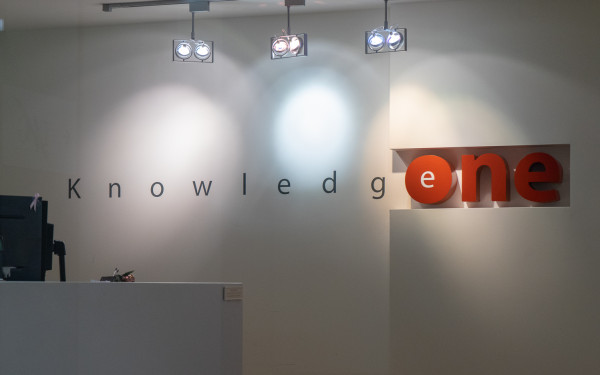Concordia Set to Expand E-Learning Program
Massive Open Online Classes, In-Class Multimedia on the Way
You get out of bed, go to the kitchen. A slice of toast and a glass of milk later, and you’re snuggled in your sheets, checking your laptop. Also, you just got to class.
In the age of information, where the Internet doubles in size every five years, Concordia University is looking to change its teaching methods to accommodate.
The university says specifics will not be released until next month—so live-streaming lectures from the comfort of home may not yet be on the table—but change is coming.
E+Learning
“There is still a lot of misinformation about what online learning is,” admitted Concordia President Alan Shepard. “People still think it’s really boring, or it’s really easy—it’s like a gut course, or whatever you guys call it, to get an easy A.”
Since 2000, Concordia has been offering accredited courses online in partnership with eConcordia, a for-profit corporation set up in adjunct to the university.
Growing from roughly 10 courses offered in 2006, 53 credited courses were available for students enrolled this winter semester.
The online entity now accounts for 15 per cent of university enrolment, with about 33,000 unique students registered to take e-courses.
But the upcoming e-learning plan is not just for current Concordia students, according to Shepard. The university is looking to offer massive open online courses, according to a presentation given by interim provost Lisa Ostiguy at a Senate meeting on Feb. 15.
“The MOOC is an open course, anyone can sign up,” said Shepard.
“They don’t have to have any prerequisites, background, marks, diploma, nothing. And they are going to get no formal academic credentials even if they complete [the class], so the carrot at the end of the stick is all about intellectual development,” he added.
MOOCs emerged as an online teaching platform in 2008, but the format did not gain widespread popularity until 2011.
Major projects, such as Coursera and EdX—a joint venture between Harvard University and the Massachusetts Institute of Technology—now offer classes with over 100,000 students.
One major criticism levied against MOOCs is the associated high dropout rates, but according to Shepard the new format is still evolving.
“MOOCs are an experiment,” he explained. “They’ve been going for like a year, and you know the car you drive now is not the car that was built in 1912.”
Upgrades are also tabled for traditional classes as well. The university is exploring a blended-course approach: a mixture between conventional teaching pedagogy and the emerging new world of the Internet, according to Shepard.
“I think the whole world is going towards more courses that are called blended, where I might meet you once a week and instead of just telling you what’s in the textbook—which is what I might have done 25 years ago—you would have [had a] dynamic, interactive experience and then you would come to class,” he said.
In a blended course approach, lesson plans would utilize collaborative, imaging and multimedia software as part of the curriculum, while ensuring students and their professors still meet face-to-face regularly.
To Shepard, the new approach might someday become the most popular teaching format.
“I think there will be some percentage of pure online courses and pure online degrees,” he said. “There will be some that are pure traditional lectures and then there will be a big one in the middle, which is blended.”
But while Concordia’s online future appears promising, some in the university community say problems with Concordia’s past online initiatives need to be addressed as well—namely those having to do with eConcordia.
A History of Grievances
Though it delivers online courses accredited by the university, eConcordia is not owned by Concordia directly.
Operated by KnowledgeOne, a subsidiary of econcordia.com, known directors of eConcordia include both current and former university presidents as well as members of Concordia’s Board of Governors—the institution’s highest decision-making body.
Current KnowledgeOne administrators include Shepard, Concordia VP Institutional Relations and Secretary-General Bram Freedman and Chief Financial Officer Patrick Kelley, according to the Régistraire des entreprises Québec.
But according to Robert Sonin, president of Teaching and Research Assistants at Concordia, the major grievances with eConcordia are coming from its teaching staff.
Teaching assistants from the university are contracted to eConcordia to lead online courses, explained Sonin.
But eConcordia TAs are not reimbursed at the same pay grade as in-class TAs would be for the same amount of work; in fact, they often do more for less, he said.
“EConcordia content is created by the professors, but it’s delivered by TAs, so if you’ve taken an eConcordia course—even more so than any other course—it is absolutely guaranteed your work is judged by TAs,” he continued.
According to Sonin, the extra TAs curb costs spent on professors, whose salaries are much higher than part-time graduate students.
“Online e-learning as a separate category of class was invented basically to make money,” said Sonin. “What you can do is increase the class size to the size of one of these MOOCs, where literally you could have thousands of people in one class.”
Grievances from TAs filed with the university by TRAC are ongoing, according to Sonin.
“We haven’t met [a TA] happy with an eConcordia course,” he stated.
“They go from a sort of middle of the road, where maybe it’s okay—but compared to what? Compared to a regular one, it’s not okay.”
A Refreshed Start
To Shepard, a few difficulties with eConcordia do not spoil the initiative.
“My impression is that the e-learning is going well,” he said.
Last fall, Saul Carliner was appointed as the new e-learning fellow, tasked with advocating for the e-learning program both in and outside of the university.
An updated plan is expected to be presented to Senate by Ostiguy, the interim provost, on March 15.
Concordia will showcase its revamped e-learning plan when it hosts the e.SCAPE conference in early April.
Sonin says he is not overly hopeful.
“I don’t know what is coming, exactly,” he revealed. “I don’t know if there’s a real sort of vision of what they want e-learning to be. My vision would be that e-learning is not really a thing—it’s not something that you do, it’s just part of life.”
As for Shepard however, the focus is on the digital frontier ahead.
“There are lots of signs on the horizon of really substantial changes in our education,” he said.
“I would like to position Concordia so we are a leader in Canada in incorporating and engaging technology to strengthen experience for students.”

(WEB)_900_569_90.jpg)


_600_375_90_s_c1.jpg)
(WEB)_600_375_90_s_c1.jpg)

